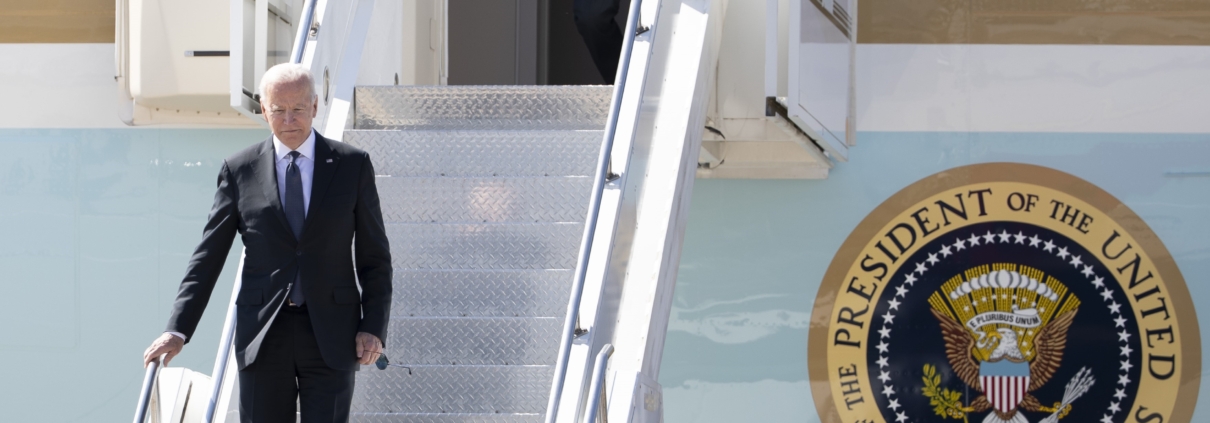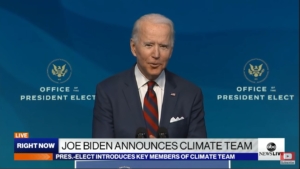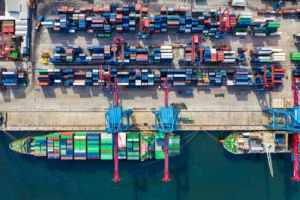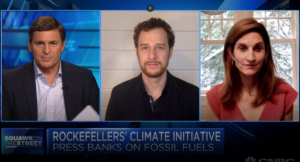Biden Goes Global
Here’s What You Need to Know
It is the grand tradition of presidents who lose control of Congress to lean into foreign policy matters in which they can act with fewer legislative constraints. President Joe Biden wasted no time following this tradition, heading around the world before the votes were fully counted. His itinerary provided a glimpse into where his administration will focus abroad, spanning the 27th United Nations Climate Change Conference (COP27) in Egypt, G-20 Summit in Indonesia, and ASEAN Summit in Cambodia, the last of which included a high-profile meeting with Chinese President Xi Jinping.
While The White House’s recently released National Security Strategy “leaves more questions than answers about the White House’s approach to global crises,” in this era of heightened geopolitics, public affairs professionals cannot wait to see how Biden tackles foreign policy in the next two years. Biden will be under pressure from a GOP-controlled House regarding assistance to Ukraine and U.S.-China relations, but countless other international debates garnering less attention will impact a wide range of industries. Here is what public affairs professionals need to know as they prepare for Biden going global.
From Climate to Covid, Biden Can Use the Multilateral Stage to Advance His Agenda
Delivering Climate Aid to Developing Countries. At COP27 last month, Biden renewed his pledge of $11 billion to assist developing countries in the energy transition, even after these funds were left out of the Inflation Reduction Act this summer. A Republican-led House is unlikely to provide any funding, but Administration officials hope to leverage federal development agencies like the Export-Import Bank and the International Development Finance Corporation and a carbon credit system U.S. climate envoy John Kerry unveiled at COP27 to circumvent Congressional opposition.
Subscribe to Receive Insights
"*" indicates required fields
Negotiating the WHO Pandemic Accords. Biden recently appointed Ambassador Pamela Hamamoto, who served as President Obama’s envoy to U.N. agencies in Geneva, to represent the U.S. in negotiations of the WHO’s proposed Pandemic Treaty. The accord – which the WHO is looking to have finalized by May 2024 – seeks to more effectively respond to future global health emergencies, and is likely to include several provisions impacting the pharmaceutical industry and other health innovation, as it could include intellectual property waivers, mechanisms to transfer technologies, and disclosure requirements in public procurement contracts.
Pressuring Countries to Enact a Global Minimum Tax. Having secured a 15% corporate minimum tax on many large firms in the Inflation Reduction Act, expect Treasury Secretary Janet Yellen to pressure other nations to keep their commitment to enacting their own minimum tax on multinational corporations – an early Administration ‘win’ on the global stage.
Great Wall of Congress May Force Biden to Stay Tough on China with a Little Help from Some Friends
Warming up to Xi, but not recoupling. Biden’s G20 meeting with Xi highlighted his desire “to find ways to work together on urgent global issues,” but the President has shown little sign of slowing efforts to disentangle critical American industries from Chinese supply chains. His administration recently announced new export control measures restricting China’s access to chips and chip-manufacturing equipment, and the Commerce Department will soon release preliminary finding in a prominent Chinese solar panel dumping case that could spur tariffs on imports when the President’s two-year moratorium ends.
Transforming Trump’s Tariffs into Biden’s Tariffs. The Biden Administration has so far maintained the Section 301 Tariffs that levied duties of up to 25% on hundreds of Chinese imports for national security reasons. However, the statutorily required four-year review of these duties, as well as ongoing legal actions and the December 31 expiration of several product exclusions, gives the Administration the opportunity to reassess which products should remain protected. The comment period for the four-year review is open until January 17. With strong pressure from Biden’s base to maintain protectionist policies and both parties keeping the heat on China, expect firms to increase their lobbying efforts as decision time approaches.
Coupling With Taiwan. This month, the U.S. began talks with Taiwan aimed at strengthening trade and economic ties, with hopes for a pact as soon as next year. China has condemned the trade initiative, which would be a boon to the U.S. agriculture and technology sectors, as Taiwan is the sixth-largest export market for U.S. food and agricultural products and the number one manufacturer and exporter of semiconductor chips in the world. The pact has the potential to ease the ongoing chip shortage.
Strengthening Indo-Pacific Ties. In the wake of the historic and encompassing Regional Comprehensive Economic Partnership (RCEP) trade agreement between the ten ASEAN countries and their six regional trading partners, including China, the Biden Administration will need to consider how it approaches trade liberalization in the Indo-Pacific. The recent Indo-Pacific Economic Framework may be a start, but it is far from a full-fledged free trade deal and India, a major player in the region, hasn’t signed on to its trade pillar, despite a recent visit by Treasury Secretary Janet Yellen. Biden has also been pushing for a digital trade agreement in the Indo-Pacific. Such an agreement would signal the U.S.’s commitment to strengthening ties in the region, especially economically, with an industry that is of strategic interest and commercial value.
Balancing Climate and Energy Security in European Relations
Boosting LNG Shipments to Europe…Or Retracting? Biden is trying to thread the needle between assuaging European allies who seek more LNG imports to supplant their reliance on Russian natural gas and the environmental justice advocates in his political base who disapprove of additional fossil fuel infrastructure. Biden has pledged to expand LNG exports to the EU to 50 billion cubic meters by 2030, though members of Congress from his own party are objecting, and some European officials are becoming perturbed by American “profiteering.”
Carbon Border Tax and Cleantech Subsidies Could End Biden’s Transatlantic Climate Camaraderie. Biden came into office hopeful for a Transatlantic alliance in climate policy, but it could become a climate clash as the EU enters the final stages of adopting a tax on carbon-intensive imports from countries – including the U.S. – that do not meet their imposed carbon emissions standards, starting in 2026. The tax will impact U.S. manufacturers of aluminum, steel, electricity, cement, and fertilizers that export to the EU. Here at home, Biden has indicated support for a carbon border tax of our own, and Senator Sheldon Whitehouse (D-RI) introduced legislation to do so in June. Meanwhile, European officials are becoming increasingly incensed by the domestic cleantech manufacturing subsidies and incentives embedded in Biden’s Inflation Reduction Act.
As Latin America Goes Left, Will Biden Go Along?
Navigating a Tricky Relationship with Mexico. Even if the border crisis headlines the bilateral relationship with Mexico, the country is also the United States’ third largest trading partner. Mexican President Andrés Manuel López Obrador (AMLO) has rocked the USMCA boat with some of his recent protectionist moves, including talk of nationalizing energy production and restricting GMO corn. While possibility of an all-out trade war seems unlikely, the Administration will have to choose how hard to push back against potential violations of the USMCA, and whether to prosecute potential treaty violations through relatively untested official channels, or keep things unofficial.
Freeing Hydrocarbons Even If the People Aren’t Free. The Biden Administration recently allowed Chevron to resume operations in Maduro-controlled Venezuela even as Senator Marco Rubio (R-FL) claims the Administration tried to oppose an Inter-American Development Bank loan supporting Guyana’s development of its energy infrastructure. As Congress shifts hands, expect more scrutiny of how Biden approaches energy production in the region.
Ensuring Access to Present and Future Resources. Newly elected leftist governments mean access to natural resources may be less certain: Colombia’s Petro seeks to leave oil behind; Peru’s Castillo has pushed to increase taxes on mining companies; Brazil’s Lula promised, in contrast to his opponent, to keep Brazil’s state oil company public; and Chile’s Boric contemplated a public lithium company. Indeed, Argentina, Bolivia, and Chile are discussing a “Lithium OPEC.” The Biden Administration has signaled its commitment to free enterprise in the region, but how willing it is to push back on these policy shifts is unclear, and ensuring access to these resources could conflict with Biden’s climate agenda in the region. While Biden has unveiled a framework for regional economic cooperation similar to its Indo-Pacific proposal, his administration has yet to demonstrate real enthusiasm for new or strengthened trade agreements in either region.
Biden’s Middle East Dilemmas
Pressuring Saudi Arabia on Oil Supply. After Saudi Arabia announced its support for OPEC’s cuts in oil production by two million barrels per day despite Biden’s attempt at mending ties with the de facto Saudi ruler, Biden declared there would be consequences. Potential repercussions could include military support reductions, arms sales cancellations, and enacting the “NOPEC” bill, which would classify OPEC as an illegal cartel and subject its members to U.S. antitrust enforcement. With mixed signals on whether OPEC will increase production soon, expect this relationship to remain as volatile as oil prices.
Reengaging In Nuclear Talks with Iran. With the U.S. condemning Iran’s brutal attacks on human rights protestors, Biden faces a challenging new dilemma: how can he continue his efforts to revive the Obama-era nuclear deal amidst some of the most widespread protests against the regime’s brutality in ten years? There are indications he has put the deal on the shelf for now, but a renewed deal was a key campaign pledge eagerly sought by many of his advisers.
Responding To Netanyahu’s Return. With Benjamin Netanyahu returning as Prime Minister of Israel, Biden will be working with a new (again) leader of the U.S.’s most important Middle East ally. The relationship between Biden and Netanyahu is decades-old and fraught with disagreements, including over the aforementioned 2015 nuclear deal with Iran, the necessity for a two-state solution, and the status of Israeli’s disputed territories. Now, as Netanyahu works to form a government, Biden’s Justice Department has launched “a rare, if not unprecedented” probe into a Palestinian-American journalist’s death, despite an already concluded inquiry by the State Department that found no intentional wrongdoing. Biden and Bibi are also likely to disagree over the value of the Abraham Accords, which the latter negotiated and views as the key to regional security. Yet the Biden Administration has displayed skepticism if not hostility to the Accords and their value in the region, even as they open trade and economic development between key countries in the region.
Critical Industries Have a Lot at Stake
Facing a divided Congress, President Biden will go his own way a lot more in the next two years, wielding the “phone and pen” of executive action on domestic policy and spending more time on foreign policy matters in which he has more autonomy to act. To advance and protect their organizations’ business and policy objectives, public affairs professionals should be prepared for the impact that Biden’s actions abroad may have for their industry, and how different interests and stakeholders can shape and influence those actions.



